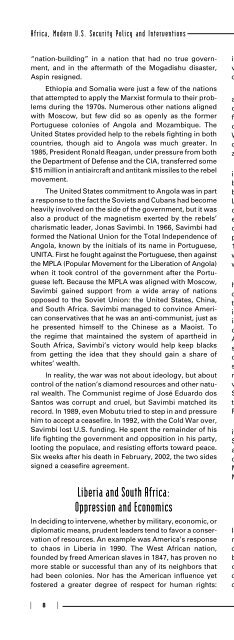ENCYCLOPEDIA OF Espionage, Intelligence, and Security Volume ...
ENCYCLOPEDIA OF Espionage, Intelligence, and Security Volume ...
ENCYCLOPEDIA OF Espionage, Intelligence, and Security Volume ...
You also want an ePaper? Increase the reach of your titles
YUMPU automatically turns print PDFs into web optimized ePapers that Google loves.
Africa, Modern U.S. <strong>Security</strong> Policy <strong>and</strong> Interventions“nation-building” in a nation that had no true government,<strong>and</strong> in the aftermath of the Mogadishu disaster,Aspin resigned.Ethiopia <strong>and</strong> Somalia were just a few of the nationsthat attempted to apply the Marxist formula to their problemsduring the 1970s. Numerous other nations alignedwith Moscow, but few did so as openly as the formerPortuguese colonies of Angola <strong>and</strong> Mozambique. TheUnited States provided help to the rebels fighting in bothcountries, though aid to Angola was much greater. In1985, President Ronald Reagan, under pressure from boththe Department of Defense <strong>and</strong> the CIA, transferred some$15 million in antiaircraft <strong>and</strong> antitank missiles to the rebelmovement.The United States commitment to Angola was in parta response to the fact the Soviets <strong>and</strong> Cubans had becomeheavily involved on the side of the government, but it wasalso a product of the magnetism exerted by the rebels’charismatic leader, Jonas Savimbi. In 1966, Savimbi hadformed the National Union for the Total Independence ofAngola, known by the initials of its name in Portuguese,UNITA. First he fought against the Portuguese, then againstthe MPLA (Popular Movement for the Liberation of Angola)when it took control of the government after the Portugueseleft. Because the MPLA was aligned with Moscow,Savimbi gained support from a wide array of nationsopposed to the Soviet Union: the United States, China,<strong>and</strong> South Africa. Savimbi managed to convince Americanconservatives that he was an anti-communist, just ashe presented himself to the Chinese as a Maoist. Tothe regime that maintained the system of apartheid inSouth Africa, Savimbi’s victory would help keep blacksfrom getting the idea that they should gain a share ofwhites’ wealth.In reality, the war was not about ideology, but aboutcontrol of the nation’s diamond resources <strong>and</strong> other naturalwealth. The Communist regime of José Eduardo dosSantos was corrupt <strong>and</strong> cruel, but Savimbi matched itsrecord. In 1989, even Mobutu tried to step in <strong>and</strong> pressurehim to accept a ceasefire. In 1992, with the Cold War over,Savimbi lost U.S. funding. He spent the remainder of hislife fighting the government <strong>and</strong> opposition in his party,looting the populace, <strong>and</strong> resisting efforts toward peace.Six weeks after his death in February, 2002, the two sidessigned a ceasefire agreement.Liberia <strong>and</strong> South Africa:Oppression <strong>and</strong> EconomicsIn deciding to intervene, whether by military, economic, ordiplomatic means, prudent leaders tend to favor a conservationof resources. An example was America’s responseto chaos in Liberia in 1990. The West African nation,founded by freed American slaves in 1847, has proven nomore stable or successful than any of its neighbors thathad been colonies. Nor has the American influence yetfostered a greater degree of respect for human rights:ironically, the freed slaves, known as Americo-Liberians,virtually enslaved the native Liberians, who lived underconditions of forced labor <strong>and</strong> extreme poverty.Finally, in 1980, Sgt. Samuel K. Doe led a revoltagainst President William Tolbert, ending 133 years ofoppression. Doe, however, proved a tyrant, <strong>and</strong> he benefitedfrom some $500 million in U.S. aid even as the qualityof life for the Liberian populace continued to decline.When rebels overthrew Doe in 1990, the United Statesquietly evacuated its diplomatic personnel <strong>and</strong> other citizensfrom the troubled nation.In part because the nation-state is a western constructimposed on Africa, life in post-colonial times has oftenbeen characterized by the oppression of one ethnic groupby another: first Hutu by Tutsi, then the reverse, first nativeLiberians by Americo-Liberians, then the reverse, <strong>and</strong> soon. As most of these situations involved native Africanethnic groups, they have attracted little attention in theoutside world. By contrast, the regime of apartheid thatprevailed in South Africa for more than four decades after1948, involving as it did oppression of a black majority by awhite minority, invoked sharp criticism throughout thewestern world.Although many Americans had long condemned apartheid,the issue did not become a part of American popularculture until 1985, as entertainers <strong>and</strong> college studentstook up the cause. Activists pressured the Reagan administrationto deal aggressively with South Africa, <strong>and</strong> toisolate the nation economically. In fact the United Statesdid impose a number of economic restrictions on SouthAfrica, but not to a degree dem<strong>and</strong>ed by activists. Thesolutions that worked with recalcitrant U.S. states duringdesegregation in the 1960s would not necessarily be assuccessful with an independent nation in the 1980s. Reaganreasoned that while apartheid did not comport with U.S.values, South Africa was of far greater value to the UnitedStates than many of its most outspoken critics—amongthem Zimbabwe, home to the notorious dictatorship ofRobert Mugabe.Reagan’s administration used a combination of limitedeconomic <strong>and</strong> diplomatic pressure, while allowingSouth Africans—who at least had a framework of European-stylerepresentational government—to work out theirown differences. In the end, opposition leader NelsonM<strong>and</strong>ela was released from prison, apartheid fell, <strong>and</strong>M<strong>and</strong>ela became the president of a new South Africa.Other Interventions <strong>and</strong>Non-InterventionsIn terms of economic intervention, Sierra Leone <strong>and</strong> Chadmay offer positive examples of what the world communitycan do to affect policy in Africa. In 2000, the UN imposed aban on the purchase of diamonds from Sierra Leone, salesof which had been used in large part to fund that nation’scivil war. Two years later, the 11-year war ended in aceasefire.8 Encyclopedia of <strong>Espionage</strong>, <strong>Intelligence</strong>, <strong>and</strong> <strong>Security</strong>







![The Big Lie 9-11 and Government Complicity in Mass Murder [PDF]](https://img.yumpu.com/50957077/1/190x245/the-big-lie-9-11-and-government-complicity-in-mass-murder-pdf.jpg?quality=85)








